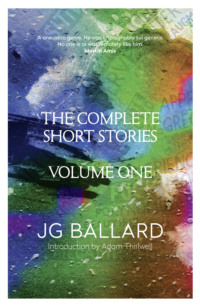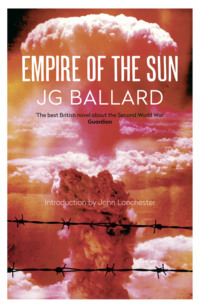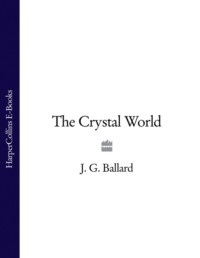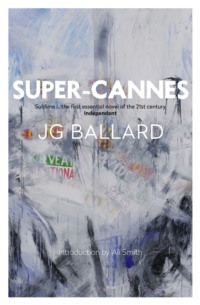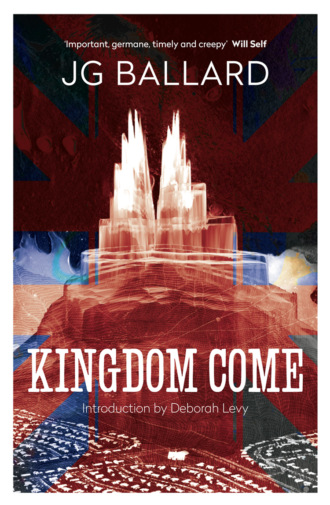
Полная версия
Kingdom Come

J. G. BALLARD
Kingdom Come

Copyright
Fourth Estate
An imprint of HarperCollinsPublishers Ltd
77–85 Fulham Palace Road
London W6 8JB
4thestate.co.uk
First published in Great Britain by Fourth Estate in 2006
Copyright © J. G. Ballard 2006
The right of J. G. Ballard to be identified as the author of this work has been asserted by him in accordance with the Copyright, Design and Patents Act 1988.
Introduction copyright © Deborah Levy 2014
Interview copyright © Sarah O’Reilly 2007
‘Remaking the World’ copyright © J. G. Ballard 2007
A catalogue record for this book is available from the British Library.
This novel is entirely a work of fiction. The names, characters and incidents portrayed in it are the work of the author’s imagination. Any resemblance to actual persons, living or dead, events or localities is entirely coincidental.
All rights reserved under International and Pan-American Copyright Conventions. By payment of the required fees, you have been granted the non-exclusive, non-transferable right to access and read the text of this e-book on-screen. No part of this text may be reproduced, transmitted, down-loaded, decompiled, reverse engineered, or stored in or introduced into any information storage and retrieval system, in any form or by any means, whether electronic or mechanical, now known or hereinafter invented, without the express written permission of HarperCollins.
Cover by Stanley Donwood, from a photographic copperplate etching.
Ebook Edition © FEBRUARY 2006 ISBN: 9780007290109
Version: 2014-07-11
Contents
Cover Title Page Copyright Introduction by Deborah Levy Part I Chapter One: The St George’s Cross Chapter Two: The Homecoming Chapter Three: The Riot Chapter Four: The Resistance Movement Chapter Five: The Metro-Centre Chapter Six: Going Home Chapter Seven: Snakes And Ladders Chapter Eight: Accidents And Emergencies Chapter Nine: The Beach At The Holiday Inn Chapter Ten: Street People Chapter Eleven: A Hard Night Chapter Twelve: Neon Palaces Chapter Thirteen: Duncan Christie Chapter Fourteen: Towards A Willed Madness Chapter Fifteen: The Prisoner In The Tower Chapter Sixteen: The Bomb Attack Chapter Seventeen: The Geometry Of The Crowd Chapter Eighteen: A Failed Revolution Chapter Nineteen: The Need To Understand Chapter Twenty: The Racing Circuit Chapter Twenty One: A New Politics Part II Chapter Twenty Two: The Trenchcoat Hero Chapter Twenty Three: The Women’s Refuge Chapter Twenty Four: A Fascist State Chapter Twenty Five: Lonely, Lost, Angry Chapter Twenty Six: A Bullet In The Hand Chapter Twenty Seven: An Anxious Intermission Chapter Twenty Eight: The Old Man’s Quest Chapter Twenty Nine: The Stricken City Chapter Thirty: Assassination Chapter Thirty One: ‘Defend The Dome!’ Chapter Thirty Two: The Republic Of The Metro-Centre Part III Chapter Thirty Three: The Consumer Life Chapter Thirty Four: Work Makes You Free Chapter Thirty Five: Normality Chapter Thirty Six: Shrines And Altars Chapter Thirty Seven: Prayers And Wool-Wash Cycles Chapter Thirty Eight: Tell Him Chapter Thirty Nine: The Last Stand Chapter Forty: Exit Strategies Chapter Forty One: A Solar Cult PAPERING OVER THE CRACKS: J. G. Ballard talks to Sarah O’ Reilly REMAKING THE WORLD by J. G. Ballard About the author By the same author About the Publisher
INTRODUCTION BY DEBORAH LEVY
Consumerism rules, but people are bored. They’re out on the edge, waiting for something big and strange to come along … They want to be frightened. They want to know fear. And maybe they want to go a little mad.
J. G. Ballard, Kingdom Come
J. G. BALLARD, our greatest literary futurist, changed the coordinates of reality in British fiction and took his faithful readers on a wild, intellectual ride. He never restored moral order to the proceedings in his fiction because he did not believe we really wanted it. Whatever it was that Ballard next imagined for us, however unfamiliar, we knew we were in safe hands because he understood ‘the need to construct a dramatically coherent narrative space’.
When I was a young writer in the 1980s, Ballard first came to my attention after I read his luminous, erotic story collection, The Day of Forever. It was so formally inventive that I would not have guessed it had been published in 1967. Nor did I know that the baffled conservative literary establishment of his generation had tried to see off his early work as science fiction. Ballard always insisted he was more interested in inner space than outer space.
When it came to anything by Ballard, genre really did not matter to me; his fiction could have been filed under Tales of Alien Abduction or Marsh Plants and I would have hunted it down. Despite our difference in generation, gender and literary purpose, it was clear to me that he and I were both working with some of the same aesthetic influences: film, Surrealist art and poetry, Freud’s avant-garde theories of the unconscious. I was just starting to write but Ballard made me feel less lonely. Perhaps more significantly we shared the dislocation of not being born in Britain. Home was the imagination. I too was attracted to the paintings of de Chirico and Delvaux, with their dreamplaces – empty, melancholy cities, abandoned temples, broken statues, shadows, exaggerated perspectives. Ballard was going to make worlds we had not seen before in British fiction. When asked, after the success of Empire of the Sun, why it took him so long to write in a less disguised way about his childhood experience at the internment camp in Lunghau, his beautiful answer was that is took him ‘twenty years to forget and twenty years to remember’. Of course, images from Shanghai and the war were laid forever inside him. I have always thought that his books, with the exception of Crash, which seems to me an abstract attempt to grieve for his dead wife, were already written in that one room he shared with his parents between 1943 and 1945. The reach of his imagination was never going to fit with the realist literary mainstream but I was always encouraged by his insistence that he was an imaginative writer.
I believe in the power of the imagination to remake the world, to release the truth within us, to hold back the night, to transcend death, to charm motorways, to ingratiate ourselves with birds, to enlist the confidences of madmen.
Good on you Jim.
There is a great deal of rather strained legend-making when it comes to Ballard, but it is the witty, deadpan, open-minded American journalist and pianist, V. Vale, founder of the tremendous RE/Search Publications and champion of Ballard since 1973, who in my view tracked his thought drifts most sensitively in various interviews. I have never regarded Ballard as a kind of psychogeographer of postmodernity; his most enjoyable fiction is more Dada than Debord.
I believe in the impossibility of existence, in the humour of mountains, in the absurdity of electromagnetism, in the farce of geometry, in the cruelty of arithmetic, in the murderous intent of logic.
His highly imagined landscapes and abandoned aircraft and stopped clocks and desert sand were located in his head – and anyway he preferred driving fast cars to walking. He once sent me a photograph of the Heathrow Hilton and told me it was his spiritual home.
What was it that Ballard offered to me as a young female writer? It is more to do with what he did not offer. He preferred social theory to social realism. I was not going to run to Ballard’s books to learn how to write a ‘well rounded’ character, for God’s sake. His characters are more like tannoys to broadcast his arguments and ideas. But I did love his gloomy, unbelievable male psychiatrists, cinematically lit, groomed, suave and perverse, sipping a stiff gin and tonic in towelling robes while they observe (and possibly medicate) everyone else freaking out around them. The well-mannered narrators in the later novels (Cocaine Nights, Super-Cannes, Millennium People, Kingdom Come) are mostly mild, middle-class, manly men. Their destiny is to become inflamed Nietzschean men, excited to finally understand that they too would like to punch their fists through the boredom of the empty, greedy, good life with its fragile veneer of civilisation. Yet I have always regarded Ballard as quite a humane writer, a paternal writer, steering us through the ruins of his dystopias via the mindset of his apparently rational avatars – always endearingly baffled to discover their own suppressed urges.
I enjoyed his noirish female characters too (many of them doctors), enigmatic instead of domestic, emotionally unavailable, sexually experimental, sometimes tanned and thuggish, as in Cocaine Nights, or vulnerable but corruptible as in Kingdom Come – but the great thing is that they do not want the male lead to marry them and are never about to roast a chicken.
I believe in the beauty of all women, in the treachery of their imaginations, so close to my heart.
All these years later, I still marvel at the eerie poetry of Ballard’s prose. It lingers like a strange perfume over his concise, matter-of-fact sentences, more heightened in the earlier novels and short stories, but the bottom notes (petrol, anguish, desire, nightmares) are still present in the first three lines of his final and most didactic novel, Kingdom Come.
The suburbs dream of violence. Asleep in their drowsy villas, sheltered by benevolent shopping malls, they wait patiently for the nightmares that will wake them into a more passionate world …
Kingdom Come is an exuberant, crazed, maverick, twenty-first-century re-staging of Freud’s Civilisation and Its Discontents. We have our usual Ballardian narrator, a decent chap, former advertising executive Richard Pearson, who, while driving down the slow lane of the M25, is surprised to find the indicator ticking as if it has a mind of its own. Pearson obeys his car’s invitation to turn down a slip road, which ‘I had somehow known was waiting for me’. Ballard believed our unconscious plans a number of assignments for us. The slip road leads to the small motorway town of Brookfields, near Heathrow. Pearson’s father, a retired air pilot, has been killed by a deranged mental patient who opened fire, apparently at random, on the crowds shopping at the Metro-Centre, a massive mall in the centre of this town. Pearson suspects there is more to find out about his father’s death and begins his investigations – with the oedipal help of the attractive female doctor who attended to his dying father, and who for some reason has sex with his son.
There are no space ships hovering above the Metro-Centre, with its ‘humid, microwave air’, but the minds of the citizens who shop there have definitely been abducted by hyper-consumerism.
At the sales counter, the human race’s greatest confrontation with existence, there were no yesterdays, no history to be relived, only an intense transactional present.
The former advertising executive starts to uncover the drives of the savage consumers of Middle England who lug home refrigerators, toasters, televisions, beat up Asian shop keepers and lavish affection on the three giant teddy bears sitting in the atrium of the Metro-Centre. Naturally, these Disneyesque toys are pierced with bullet holes.
Kingdom Come is a sort of fairy tale in which ‘a more primitive world’ is ‘biding its time’. The blades of knives on display in the mall’s hardware store menacingly form, ‘a silver forest in the darkness’. Ballard explores the pre-rational nationalism that replaces politics, the mass spectacle of St George’s flags waved at the endless parades and sports matches. ‘No Sieg Heils, but football anthems instead. The same hatreds, the same hunger for violence, but filtered through the chat-show studio and the hospitality suite.’
It seems that for Ballard, the labyrinthine Metro-Centre is as enthralling as de Chirico’s brooding Italian archways and piazzas. Once again he will chase his obsessions and try to convince us that the modern personality most likely to survive late capitalism will be the elective psychopath.
If Freudian theory is waving to us through the St George’s flags, Ballard makes sure its fingernails are bitten raw. As he has often stated, his literary aim was to find the hidden wiring in the fuse box of modernity. In the case of Kingdom Come, consumerism slips into ‘soft’ fascism. As a former advertising executive, Richard Pearson knows that ‘all he is good at is warming the slippers of late capitalism’ and the future is ‘a cable TV program going on forever’, a barcode, CCTV camera and a parking space. And what about dreams?
The Metro-Centre is dreaming you. It’s dreaming all of us.
Kingdom Come does nothing less than perform keyhole surgery on late capitalism’s heart of darkness.
Stockholm, 2014
PART I
1
The St George’s Cross
THE SUBURBS DREAM of violence. Asleep in their drowsy villas, sheltered by benevolent shopping malls, they wait patiently for the nightmares that will wake them into a more passionate world …
Wishful thinking, I told myself as Heathrow airport shrank into the rear-view mirror, and more than a little foolish, an advertising man’s ingrained habit of tasting the wrapper rather than the biscuit. But they were thoughts that were difficult to push aside. I steered the Jensen into the slow lane of the M4, and began to read the route signs welcoming me to the outer London suburbs. Ashford, Staines, Hillingdon – impossible destinations that featured only on the mental maps of desperate marketing men. Beyond Heathrow lay the empires of consumerism, and the mystery that obsessed me until the day I walked out of my agency for the last time. How to rouse a dormant people who had everything, who had bought the dreams that money can buy and knew they had found a bargain?
The indicator ticked at the dashboard, a nagging arrow that I was certain I had never selected. But a hundred yards ahead was a slip road that I had somehow known was waiting for me. I slowed and left the motorway, entering a green-banked culvert that curved in on itself, past a sign urging me to visit a new business park and conference centre. I braked sharply, thought of reversing back to the motorway, then gave up. Always let the road decide …
Like many central Londoners, I felt vaguely uneasy whenever I left the inner city and approached the suburban outlands. But in fact I had spent my advertising career in an eager courtship of the suburbs. Far from the jittery, synapse-testing metropolis, the perimeter towns dozing against the protective shoulder of the M25 were virtually an invention of the advertising industry, or so account executives like myself liked to think. The suburbs, we would all believe to our last gasp, were defined by the products we sold them, by the brands and trademarks and logos that alone defined their lives.
Yet somehow they resisted us, growing sleek and confident, the real centre of the nation, forever holding us at arm’s length. Gazing out at the placid sea of bricky gables, at the pleasant parks and school playgrounds, I felt a pang of resentment, the same pain I remembered when my wife kissed me fondly, waved a little shyly from the door of our Chelsea apartment, and walked out on me for good. Affection could reveal itself in the most heartless moments.
But I had a special reason for feeling uneasy – only a few weeks earlier, these amiable suburbs had sat up and snarled, then sprung forward to kill my father.
At nine that morning, a fortnight after my father’s funeral, I set off from London towards Brooklands, the town between Weybridge and Woking that had grown up around the motor-racing circuit of the 1930s. My father had spent his childhood in Brooklands and, after a lifetime of flying, the old airline pilot had returned there to pass his retirement. I was going to call on his solicitors, see that the probate of his will was under way, and put his flat up for sale, formally closing down a life that I had never shared. According to the solicitor, Geoffrey Fairfax, the flat was within sight of the disused racetrack, a dream of speed that must have reminded the old man of all the runways that still fled through his mind. When I packed away his uniforms and locked the door behind me, a last line would draw itself under the former British Airways pilot, an absentee parent I once hero-worshipped but rarely met.
He had left my strong-willed but highly strung mother when I was five, flown millions of miles to the most dangerous airports in the world, survived two attempted hijackings and then died in a bizarre shooting incident in a suburban shopping mall. A mental patient on day release smuggled a weapon into the atrium of the Brooklands Metro-Centre and fired at random into the lunch-hour crowd. Three people died, and fifteen were injured. A single bullet killed my father, a death that belonged in Manila or Bogotá or East Los Angeles, rather than in a bosky English suburb. Sadly, my father had outlived his relatives and most of his friends, but at least I had arranged the funeral service and seen him off to the other side.
As I left the motorway behind me, the prospect of actually turning the key in my father’s front door began to loom in the windscreen like a faintly threatening head-up display. A large part of him would still be there – the scent of his body on the towels and clothes, the contents of his laundry basket, the odd smell of old bestsellers on his bookshelves. But his presence would be matched by my absence, the gaps that would be everywhere like empty cells in a honeycomb, human voids that his own son had never been able to fill when he abandoned his family for a universe of skies.
The spaces were as much inside me. Instead of dragging around Harvey Nichols with my mother, or sitting through an eternity of Fortnum’s teas, I should have been with my father, building our first kite, playing French cricket in the garden, learning how to light a bonfire and sail a dinghy. At least I went on to a career in advertising, successful until I made the mistake of marrying a colleague and providing myself with a rival I could never hope to beat.
I reached the exit of the slip road, trailing a huge transporter loaded with micro-cars, each shiny enough to eat, or at least lick, toffee-apple cellulose brightening the day. The transporter paused at the traffic lights, an iron bull ready to rush the corrida of the open road, then thundered towards a nearby industrial estate.
Already I was lost. I had entered what the AA map represented as an area of ancient Thames Valley towns – Chertsey, Weybridge, Walton – but no towns were visible around me, and there were few signs of permanent human settlement. I was moving through a terrain of inter-urban sprawl, a geography of sensory deprivation, a zone of dual carriageways and petrol stations, business parks and signposts to Heathrow, disused farmland filled with butane tanks, warehouses clad in exotic metal sheeting. I drove past a brownfield site dominated by a massive sign announcing the Heathrow South extension with its unlimited freight capacity, though this was an empty land, where everything had already been sent on ahead. Nothing now made sense except in terms of a transient airport culture. Warning displays alerted each other, and the entire landscape was coded for danger. CCTV cameras crouched over warehouse gates, and filter-left signs pulsed tirelessly, pointing to the sanctuaries of high-security science parks.
A terrace of small houses appeared, hiding in the shadow of a reservoir embankment, linked to any sense of community only by the used-car lots that surrounded it. Moving towards a notional south, I passed a Chinese takeaway, a discount furniture warehouse, an attack-dog kennels and a grim housing estate like a partly rehabilitated prison camp. There were no cinemas, churches or civic centres, and the endless billboards advertising a glossy consumerism sustained the only cultural life.
On my left, traffic moved down a side street, family saloons hunting for somewhere to park. Three hundred yards away, a line of shopfronts caught the sun. A suburban town had conjured itself from the nexus of access roads and dual carriageways. Rescue was offering itself to a lost traveller in the form of neon signs outside a chain store selling garden equipment and a travel agent advertising ‘executive leisure’.
I waited for the lights to change, an eternity compressed into a few seconds. The traffic signals presided like small-minded deities over their deserted crossroads. I lowered my foot onto the accelerator, ready to jump the red, and noticed that a police car was waiting behind me. Like the nearby town, it had materialized out of the empty air, alerted by the wayward imagination of an impatient driver in a powerful sports car. The entire defensive landscape was waiting for a crime to be committed.
Ten minutes later I eased myself onto a banquette in an empty Indian restaurant, somewhere in the centre of the off-motorway town that had come to my aid. Spreading my map over the elderly menu, a book of laminated pages unchanged for years, I tried to work out where I was. Vaguely south-west of Heathrow, I guessed, in one of the motorway towns that had grown unchecked since the 1960s, home to a population that only felt fully at ease within the catchment area of an international airport.
Here, a filling station beside a dual carriageway enshrined a deeper sense of community than any church or chapel, a greater awareness of a shared culture than a library or municipal gallery could offer. I had left the Jensen in the multi-storey car park that dominated the town, a massive concrete edifice of ten canted floors more mysterious in its way than the Minotaur’s labyrinth at Knossos – where, a little perversely, my wife suggested we should spend our honeymoon. But the presence of this vast structure reflected the truism that parking was well on the way to becoming the British population’s greatest spiritual need.
I asked the manager where we were, offering him the map, but he was too distracted to answer. A nervous Bengali in his fifties, he watched the traffic moving down the high street. Someone had thrown a brick at the plate-glass window, and the scimitar of a giant crack veered from ceiling to floor. The manager had tried to steer me into the rear of the empty restaurant, saying that the window table was reserved, but I ignored him and sat beside the fractured glass, curious to observe the town and its daily round.
The passers-by were too busy with their shopping to notice me. They seemed prosperous and content, confidently strolling around a town that was entirely composed of shops and small department stores. Even the health centre had redesigned itself as a retail space, its window filled with blood-pressure kits and fitness DVDs. The streets were brightly lit, cheerful and cleanly swept, so unlike the inner London I knew. Whatever the name of this town, there were no drifting newspapers and chewing-gum pavements, no citizenry of the cardboard box. This was a place where it was impossible to borrow a book, attend a concert, say a prayer, consult a parish record or give to charity. In short, the town was an end state of consumerism. I liked it, and felt a certain pride that I had helped to set its values. History and tradition, the slow death by suffocation of an older Britain, played no part in its people’s lives. They lived in an eternal retail present, where the deepest moral decisions concerned the purchase of a refrigerator or washing machine. But at least these Thames Valley natives with their airport culture would never start a war.




